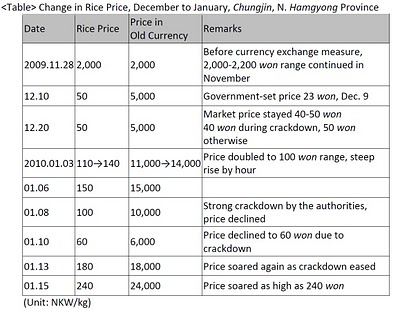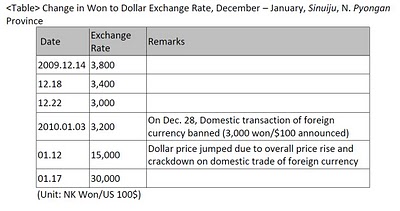The Financial Times published a thorough article on the DPRKs eforts to raise hard currency through tobacco re-exports:
North Korean and other Asian trading entities started re-exporting State Express 555 cigarettes, manufactured by British American Tobacco, in February last year, just months before North Korea’s second nuclear test in four years prompted the United Nations to impose tougher sanctions on Pyongyang.
BAT sold the so-called “NK 555s”, made and packaged in Singapore for the North Korean market, to a Singaporean distributor for shipment to Nampo, a port near Pyongyang.
However, at least 15,000 cases worth $6.3m (€4.6m, £4.2m) rebounded out of Nampo to ports in Vietnam and the Philippines, according to documents seen by the Financial Times, to go to other markets where they commanded a higher price.
While the UN banned luxury goods exports to North Korea, member nations have been allowed to compile their own sanctions lists, which critics say created loopholes.
The US, Japan, Australia and Canada banned a broad range of tobacco products. Meanwhile, the European Union and Singapore sanctioned only cigars, which allowed BAT to continue exporting NK 555 cigarettes to North Korea. BAT said it halted exports of the cigarettes from Singapore to North Korea after discovering a diverted cargo of NK 555s in August.
International tobacco companies frown on “grey market” or “parallel” exports of their products to markets for which they were not intended. But national customs authorities target counterfeits rather than so-called “diverted real product”.
…
BAT has maintained some business ties to the country. It still supplies its former Pyongyang joint venture, from which it divested in 2007, with materials to make and sell cheaper Craven A cigarettes on the domestic market.
BAT says 175m NK 555s were exported to North Korea in 2008. They were made and packaged in Singapore which, like the EU, banned exports of cigars but not cigarettes.
The London-based company sold the NK 555s to SUTL Group, a family-controlled distributor in Singapore, for onward shipment to the North Korean port of Nampo.
“When we became aware of the diversion, we immediately launched an investigation,” Pat Heneghan, global head of BAT’s anti-illicit trade division, told the FT. “We certainly didn’t like what we found.”
While there was no evidence of any involvement by SUTL in the diversion, Mr Heneghan said BAT still had “a very hard discussion with the distributor”. SUTL declined to comment.
There is no evidence that the re-export of NK 555s by a number of unidentifiable North Korean entities and other small trading companies across Asia was illegal.
While tobacco companies consider the re-routing of legitimate cigarettes from their intended market as “illicit”, they are not necessarily “illegal” in the eyes of customs authorities focused on counterfeits and smuggling.
“In August last year, BAT discovered a diverted NK 555 shipment in Singapore, which we assumed could be for transhipment to other markets in Asia,” said a BAT spokeswoman. “But we were unable to inspect the shipment as we could not demonstrate any breach of Singapore law to the authorities.”
On April 10 2009, the NK 555 re-exports were discussed in an e-mail sent by a Singapore-based cigarette trader to a potential buyer in Manila.
“We have to confirm by next week,” wrote Bert Lee of Compass Inc. “Empty containers will have to start moving into Nampo . . . So kindly speak and plan with your buyer and let me know if you want to take up this new NK 555 Blue.”
Compass began to sell cases of NK 555 to a Hong Kong-based trading company in early 2009. E-mails and shipping documents show the cigarettes were first diverted to Dalian, a Chinese port, and then shipped on to Singapore before finally landing in Haiphong in Vietnam.
While the trail ran cold in Haiphong, people tracking the shipment suspected its ultimate destination was China.
“They sell it to someone who can handle it for the China market,” said one person involved in the trade, who asked not to be identified.
Invoices sent from Compass to its Hong Kong buyer in February 2009 do not reveal the North Korean source of the NK 555s. But Mr Lee left no doubt about the cigarettes’ provenance.
“Stocks are now in NK and sample already send [sic] out to us,” he wrote to his potential buyer in Manila. “I hope we can work on this New Blue [555] and controlling the market and stocks as soon as possible.” Mr Lee did not reply to phone calls, e-mails and faxes from the FT.
“As a trader, we just get the product and buy and sell,” said one Compass executive who declined to identify himself or comment on the NK 555 shipments when contacted by telephone. “Where it goes, who knows?”
Read previous tobacco posts here. Read previous BAT posts here.
To date I have been unsuccessful in locating the BAT factory in the DPRK. If any readers have knowledge of its whereabouts, I would appreciate it.
Read the full article here:
N Korea draws on tobacco for cash
Financial Times
Tom Mitchell, Pan Kwan Yuk
3/8/2010


